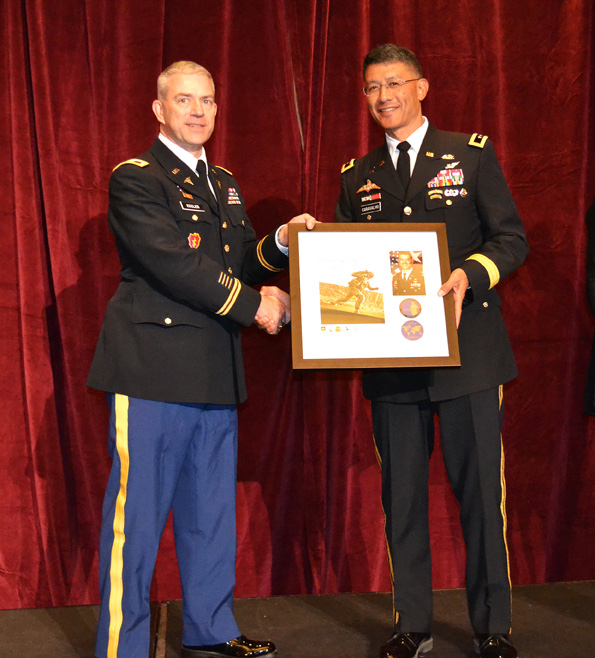From Health Care System to System for Health

The promotion of wellness has been the focal point of the 2014 3rd International Congress on Soldiers' Physical Performance in Boston, Massachusetts. Readiness, resiliency and survivability... keys to strengthening our Nation's forces and improving the overall performance and health of our military.
Maj. Gen. Joseph Caravalho, Jr., commanding general of the U.S. Army Medical Research and Materiel Command and Fort Detrick,was this year's invited Keynote Speaker at the 3rd ICSPP. Opening the second day of the meeting with a presentation titled, "Addressing the Human Dimension of Soldier Performance," Caravalho delivered this year's attendees with a detailed look into the Army initiatives currently in motion working to advance Soldier performance.
"It is a great pleasure for me to be here," opened Caravalho, "and it is a real privilege for me to be the commander of the USAMRMC. Today, I am speaking on behalf of my Surgeon General, Lt. Gen. Patricia Horoho; elevating my perspective to discuss advances in Soldier performance."
The operating environment for the U.S. military is changing. Downsizing and budget constraints are the realities. "This remains a dynamic world," continued Caravalho, and "we need to develop a more capable force."
Caravalho, a cardiologist by trade, spent a great deal of his presentation addressing the issue of Soldier performance from a medical standpoint; focusing on contributions in the human dimension realm.
"When you look at the full spectrum of care in the United States," explained Caravalho, "you see we are very good at treating the sick and caring for the dying. That is our culture, and it has been that way for decades, if not centuries...we have got to get past that type of culture."
The United States leads the world in money spent on health care, yet is far from leading the world in health. "We're not even in the top 5," said Caravalho, "so, there's a discrepancy; a lot of money spent but not a lot of return on health."
How do we shift this paradigm?
"We move the dial from 'treat the sick, treat the dying,' to disease prevention, and even further to the promotion of wellness," said Caravalho.
The Performance Triad initiative, enacted by the Army Surgeon General, is a comprehensive plan to improve readiness and increase resiliency. Through public health initiatives and leadership engagement, the hope is that this initiative will serve as the foundation for Army Medicine's transformation to a system for health. Guiding principles of the Triad center around not just maintaining health through fitness and injury/illness prevention, but also restoring health through patient-centered care and improving health through informed choices. Through three key actions -- sleep, activity and nutrition -- mindsets can be changed, new behaviors can be adopted, and everyone can make healthier choices.
"Through those three measures, we should be able to increase resiliency, increase readiness, increase long-term health, and decrease risk for chronic disease," said Caravalho.
Caravalho later switched gears, going on to discuss gender neutrality and the Soldier 2020 initiative. Soldier 2020, currently being led by the U.S. Army Training and Doctrine Command, plans to integrate women into previously "male-only" military occupational specialties. The TRADOC, in collaboration with the USAMRMC's own U.S. Army Medical Institute of Environmental Medicine, are currently working to develop physical performance standards for both men and women alike. Dr. Marilyn Sharp, senior investigator in the Medicine and Military Performance Division at the USARIEM, is the principal investigator for the TRADOC tasked study.
The TRADOC is also looking into a gender integration study, which involves studying the cultural and institutional effects of integrating women into previously closed occupations and units.
"We are very proud of what the USARIEM is doing with regard to gender neutral tasks and the standards study," said Caravalho, and "both of these together, I think, are going to define the Army of the future and the military of the future."
Caravalho wrapped up his keynote address, leaving attendees with one final thought..."I want to remind you all that we are fully engaged in Army medicine with regards to Soldier performance. Not only do we want to prevent disease or injury on and off the battlefield, we also want to decrease the risk and increase the resiliency of all our Soldiers. Our country needs our Soldiers more agile, more mobile, more survivable and more resilient. From a human dimension standpoint, the Army is fully engaged in this."
 An official website of the United States government
An official website of the United States government
 ) or https:// means you've safely connected to the .mil website. Share sensitive information only on official, secure websites.
) or https:// means you've safely connected to the .mil website. Share sensitive information only on official, secure websites.


